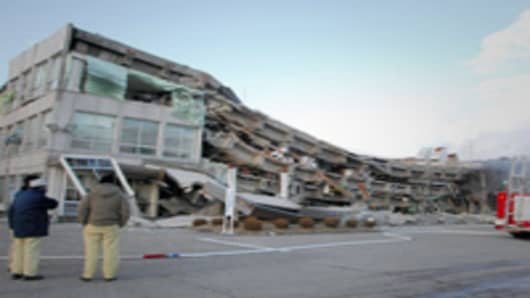Japan will get what it wants from the Group of Seven teleconference of finance ministers and central bankers Thursday night, but G-7 sources say the group is still waiting for Japan to ask.
It could well be Japan hasn't yet figured out how the world can help, or if it needs help.
Possible responses range from the obvious and heavy-handed joint currency intervention to the much more technical and benign re-opening of foreign currency swaps lines established during the financial crisis.
Many market analysts are betting on the latter, but G-7 sources say it’s not entirely clear that Japan either wants them or that they are needed.
At the height of the global financial crisis, the Fed opened foreign currency swap lines with the Bank of England, the European Central Bank, the Swiss National Bank and the Bank of Japan. Under these facilities, the Fed could offer liquidity to US banks in foreign currency to ease funding pressures in the specific currency.
The facilities were allowed to expire in February 2010 without having been used.
“I would bet that in a matter of hours the world’s central banks will establish swap lines with the BOJ to meet yen needs in the banking system outside Japan,” wrote David Gilmore of Foreign Exchange Analytics. “Keep in mind the carry trade has been the investment strategy implicitly approved of by the Japanese government … the channel for yen sales.”
It would not take much to reopen those lines, but so far it’s unclear if yen funding markets are disrupted enough to warrant them. The BOJ has pumped an enormous 34 trillion yen of liquidity into markets in the past four days. There has been no clear signal that funding markets are not clearing or that there are liquidity shortages.
Beyond opening swap lines, there is the possibility of direct intervention. But history suggests there are several steps that G-7 leaders will take before engaging in any direct coordinated foreign exchange action.
Most likely would be some form of verbal intervention, suggesting to markets that G-7 leaders have monitored the volatility and suggesting their displeasure with the direction of the currency’s movement. The intent would be to make clear to traders that there is the potential for a two-way trade in the currency with the world’s leading central banks taking the other side of the trade.
With the US government’s yen reserves only $24 billion, the heavy lifting on intervention will be up to the European Central Bank, says Marc Chandler, currency strategist at Brown Brothers Harriman.
While direct intervention is seen as a long shot, several currency strategists said the story would change if the Yen breached the 72 to 75 range to the dollar, prompting action by central banks.
There is much confusion around the reason for the currency’s sudden strength. Marc Chandler attributes 75 percent of the move to speculation with traders getting out front of the move after bullish calls from some influential analysts like Dennis Gartman and the possible repatriation of yen to pay for insurance claims and rebuilding efforts.
Chandler along with others discounts the repatriation story, arguing there is little reason for Japanese companies or the government to be stocking up on dollars yet.
The Japanese earthquake and nuclear disaster have presented world leaders with a unique challenge. Many such disasters tend to hit developing nations and the role of the developed world is clearer.
But Japan is a fully developed nation, with a world-class financial system and presumably is able to handle most of its own problems. As a result, the best G7 countries can do is pledge their support, but not jump the gun and offer aid that has not been requested.




